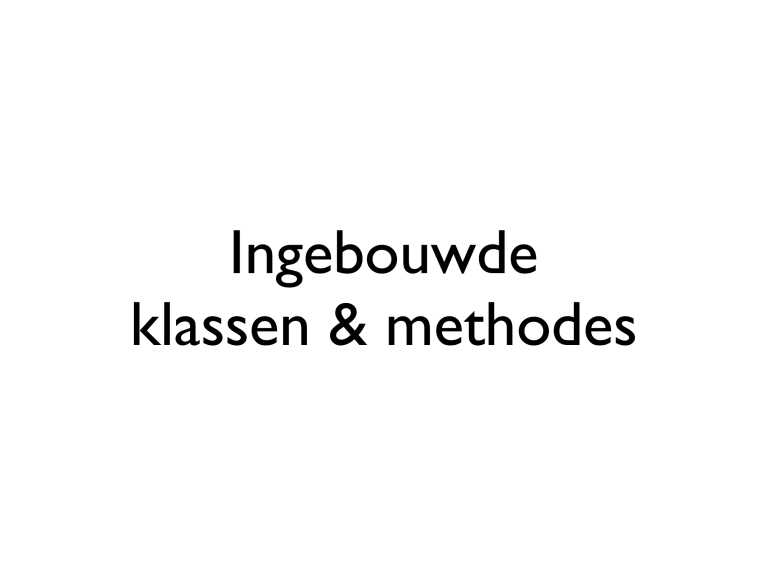
Ingebouwde
klassen & methodes
Statische methodes
• Methodes die bij een klasse horen ipv.
bij een object
public class Docent {
public static Docent departementshoofd() {
return new Docent("Jan Ivens");
}
private String naam;
public Docent(String n) {
naam = n;
}
Docent.departementshoofd();
}
Voorbeelden van static
public static void main(String[] args) { ... }
System.out.println(...);
public class System {
public static PrintWriter out;
...
}
Math.sqrt(49);
Elke klasse erft over
van Object
public class Bla { ... }
public class Bla extends Object { ... }
Elke klasse heeft exact één superklasse
class Element {
public class Lijst {
private Object waarde;
private Element eerste;
private Element volgende;
public void voegtoe(Object o) {
private void setVolgende(Element v) {
if (eerste != null)
volgende = v;
eerste.voegtoe(o);
}
else eerste = new Element(o);
Element getVolgende() {
}
return volgende;
public String toString() {
}
Element huidige = eerste;
Element(Object i) {
String resultaat = "";
waarde = i;
while (huidige != null) {
}
resultaat += huidige.toString();
void voegtoe(Object i) {
resultaat += " ";
if (volgende == null)
huidige = huidige.getVolgende();
setVolgende(new Element(i));
}
else getVolgende().voegtoe(i);
return resultaat;
}
}
public String toString() {
}
return "" + waarde;
}}
public class Lijst {
...
public void voegtoe(Object o) {
...
}
public String toString() {
...
}
}
public class Boek {
private String titel;
Boek(String t) {
titel = t;
}
public String toString() {
return "\"" + titel + "\"";
}
}
public class Bibliotheek {
private Lijst boeken;
public Bibliotheek() {
boeken = new Lijst();
boeken.voegtoe(new Boek("Catcher in the Rye"));
}
public static void main(String[] a) {
System.out.println((new Bibliotheek()).boeken);
}
}
public class Vermenigvuldigingstafel {
public class Lijst {
private Lijst tafel;
...
public Vermenigvuldigingstafel(int g) {
public void voegtoe(Object o) {
tafel = new Lijst();
...
for (int i = 1; i <= 10; i++) {
}
tafel.voegtoe(new Integer(g*i));
public String toString() {
}
...
}
}
public Lijst getTafel() {
}
return tafel;
}
public static void main(String[] a) {
int getal = Integer.parseInt(a[0]);
Vermenigvuldigingstafel t;
t = new Vermenigvuldigingstafel(getal);
System.out.println(t.getTafel());
}
}
Elke klasse erft over
van Object
public class Object {
public boolean equals(Object other) {
...
}
public String toString() {
...
}
...
}
Vergelijkingen
• Java heeft vergelijkingsoperatoren
==, !=, >, <, <=, >=
• Zoals verwacht bij primitieve types
• Let op: bij objecten testen == en != of
het om hetzelfde object gaat
ReeelGetal r = new ReeelGetal(12);
ReeelGetal s = new ReeelGetal(12);
if (r == s) System.out.println("gelijk");
if ("foo" == "foo") System.out.println("gelijk");
Vergelijkingen
• Om de inhoud van objecten te vergelijken
public boolean equals(Object);
Bijvoorbeeld:
if ("foo".equals("foo")) System.out.println("gelijk");
Integer i = new Integer(12);
Integer j = new Integer(12);
if (i.equals(j)) System.out.println("gelijk");
Voor eigen klassen, zelf implementeren
Verschilpunten tussen
objecten en primitieve
types
• new operator
• methode oproepen
• == en !=
• Call-by-value vs call-by-reference
Strings zijn objecten
Arrays zijn ongeveer objecten
public class Test {
private int waarde;
public static void veranderPrimitief(int x) {
x = 99;
}
public static void veranderObject(Test x) {
x.waarde = 99;
}
public Test(int i) {
waarde = i;
}
public static void main(String[] args) {
int i = 1;
veranderPrimitief(i);
System.out.println(i); // geeft 1
Test object = new Test(1);
veranderObject(object);
System.out.println(object.waarde); //geeft 99
}
}
Afprinten
public class ComplexGetal {
private double reeel;
private double imaginair;
public ComplexGetal(double r, double i) {
reeel = r;
imaginair = i;
}
public static void main(String [] args) {
ComplexGetal x = new ComplexGetal(7,8);
System.out.println(x);
}
}
bash-3.2$ java ComplexGetal
ComplexGetal@66848c
bash-3.2$
public class ComplexGetal {
private double reeel;
private double imaginair;
public ComplexGetal(double r, double i) {
reeel = r;
imaginair = i;
}
bash-3.2$ java ComplexGetal
public static void main(String [] args) {
7.0 + 8.0i
ComplexGetal x = new ComplexGetal(7,8);
bash-3.2$
System.out.println(x);
}
public String toString() {
return reeel + " + " + imaginair + "i";
}
public boolean equals(Object o) {
if (o instanceof ComplexGetal) {
ComplexGetal g = (ComplexGetal) o;
return g.reeel == reeel && g.imaginair == imaginair;
}
else return false;
Afprinten
Inlezen
import java.io.*;
class PersonalHello {
public static void main (String args[]) {
byte[] name = new byte[100];
int nr_read = 0;
System.out.println("What is your name?");
try {
nr_read = System.in.read(name);
System.out.print("Hello ");
System.out.write(name,0,nr_read);
}
catch (IOException e) {
System.out.print("I'm Sorry. I didn't catch your name.");
}
}
}
Inlezen (2)
import java.io.*;
class Addition {
public static void main (String[] args) throws IOException {
BufferedReader stdin = new BufferedReader(
new InputStreamReader(System.in) );
int num1, num2;
double ff;
System.out.print ("Enter an integer number: ");
num1 = Integer.parseInt (stdin.readLine());
System.out.print ("Enter another integer number: ");
num2 = Integer.parseInt (stdin.readLine());
System.out.println ("The sum is " + (num1+num2));
}
}












